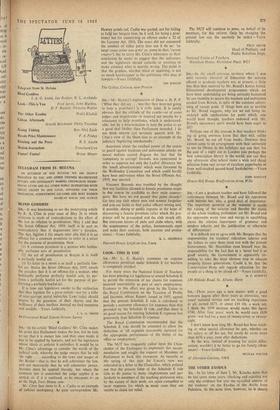Sta.—In his article 'Blind Goddess' Mr. Cline makes his point
that Parliament makes the law, but he fails to say that it is statute law, and that, once made, it has to be applied by lawyers, and not the legislators whose ideals or policies it embodies. It would be to Mr. Cline's advantage to consider the words of the judicial oath, whereby the judge swears that he will `do right . . . according to the laws and usages of the Realm'—that is, that he will administer the law, and not necessarily that he will administer justice. Statutes must be applied literally. but where the common law is concerned the judge applies it as settled, or, if it is confused, as he interprets it—as in the High Trees House case.
Mr. Cline then turns to R. v. Caslin as an example of judicial inadequacy. As your correspondent Mr.
Hawley points out, Caslin was gaoled, not for failing to fulfil her bargain (nor, be it said, for being a pros- titute) but for committing an offence under s. 32 of the Larceny Act, 1916. The court did not commend the conduct of either party (nor can it do so: 'ex turpi causa oritur non actio' or, come to that, 'caveat emptor'), but to carry Mr. Cline's inferences to their conclusion he seems to suggest that the judicature and the legislature should coincide or combine to make criminal what is morally wrong. The point is that the goddess, whether blind or squinting, is not so much handicapped as the politicians who play at lawyers.—Yours faithfully,










































 Previous page
Previous page